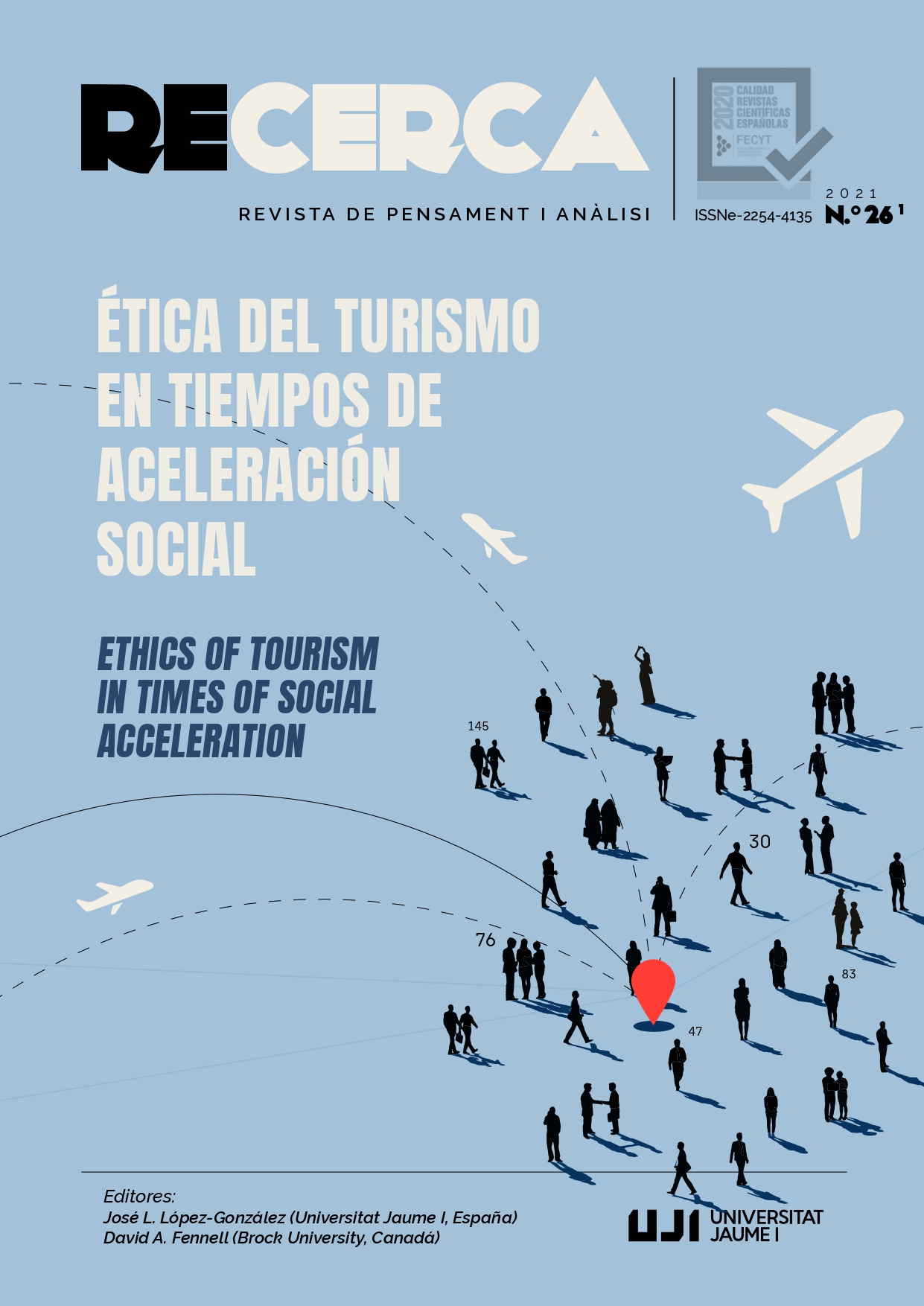La mercantilización de la comunidad. Problemas éticos del turismo comunitario
Contenido principal del artículo
Resumen
El objetivo de la presente investigación es analizar algunos problemas éticos del turismo comunitario (tc). El tc es una forma novedosa de turismo que ha aparecido en las últimas décadas en diferentes lugares del mundo, especialmente en aquellas zonas de importante población indígena. Las investigaciones hasta ahora han destacado mayoritariamente las virtudes de este tipo de turismo, y las pocas críticas que han aparecido contra el tc han tenido que ver con fallas en su funcionamiento o en el beneficio que en ocasiones no llegaba para las comunidades. Si bien las complicaciones éticas asociadas al tc no han pasado desapercibidas, en este artículo abordaremos algunos problemas éticos del tc a los que no se ha prestado tanta atención hasta el momento —como aquellos relacionados con el campo de las indigenous ethics—, que demandan una profunda reflexión sobre la utilización comercial de las comunidades.
Descargas
Detalles del artículo
Citas
Bateson, G. (1958) Naven. Standford: Standford University Press
Bauman, Z. (2000). Modernidad líquida. Buenos Aires: Fondo de Cultura Económica.
Burns, P., & Holden, A. (1995). Tourism: A New Perspective. London: Prentice Hall.
Cabanilla, E. (2015). Impactos culturales del turismo comunitario en Ecuador sobre el rol del Chamán y los ritos mágico-religiosos. Estudios Y Perspectivas En Turismo, 24(2), 356-373.
Cohen, Erik (1988). Authenticity and Commoditization in Tourism. Annals of Tourism Research 15: 371–86.
Deller, S. (2010). Rural poverty, tourism and spatial heterogeneity. Annals of Tourism Research, 37(1), 180-205.
Duffy, R. (2008). Neoliberalising Nature: Global Networks and Ecotourism Development in Madagascar. Journal of Sustainable Tourism, 16(3), 327-344.
Ermine, W., Sinclair, R., & Jeffrey, B. (2004). The ethics of research involving indigenous peoples: Report of the Indigenous Peoples’ Health Research Centre to the Interagency Advisory Panel on Research Ethics. Regina, SK: Indigenous Peoples’ Health Research Centre.
Fuentes Ortega, Juan Bautista. (2013). Entrevista: Política, metapolítica y modernidad. El caso de España. Con una adenda sobre la idea de Ortega de la “crisis del hombre europeo”. E-print UCM.
García Canclini, Néstor (1995). Consumidores y ciudadanos. México: Grijalbo.
García Palacios, Carlos. (2016). Turismo comunitario en Ecuador: ¿Quo vadis? Estudios Y Perspectivas En Turismo, 25(4), 597-614.
Gascón, J., & Cañada, E. (2005). Viajar a todo tren: Turismo, desarrollo y sostenibilidad. Barcelona: Icaria.
Grünewald, R. (2002). Tourism and cultural revival. Annals of Tourism Research 29(4):1004-1021
Hampton, M. (2003). Entry points for local tourism in developing countries: evidence from Yogyakarta, Indonesia. Geografiska Annaler, 85(2), 85–101.
Health Research Council of New Zealand. (2008). Guidelines for researchers on health research involving Māori. Auckland: Health Research Council of New Zealand.
Henrici, J. (2007). Género, turismo y exportación: ¿llamando a la plata en el Perú? Anthropologica, 25(25), 83-101.
Herbert, A. M. L., & Morrison, L. E. (2007). Practice of psychology in Aotearoa New Zealand: A Māori perspective. In I. M. Evans, J. J. Rucklidge, & M. O’Driscoll (Eds.), Professional practice of psychology in Aotearoa New Zealand (pp. 35–47). Wellington, NZ: New Zealand Psychological Society.
Hutchins, F. (2007). Footprints in the Forest: Ecotourism and Altered Meanings in Ecuador’s Upper Amazon. Journal of Latin American and Caribbean Anthropology, 12(1), 75-103.
Kelley, Allyson, Belcourt-Dittloff, Annie, Belcourt, Cheryl, & Belcourt, Gordon. (2013). Research ethics and indigenous communities. American Journal of Public Health, 103(12), 2146-52.
Kiss, A. (2004). Is community-based ecotourism a good use of biodiversity conservation funds? Trends in Ecology and Evolution 18: 222-237
Manyara, Geoffrey, Eleri Jones and David Botterill (2006). Tourism and Poverty Alleviation: The Case for Indigenous Enterprise Development in Kenya, Tourism, Culture and Communication 7(1): 19–37.
Mowforth, M., & Munt, I. (1998). Tourism and Sustainability: New Tourism in the Third World. New York: Routlledge.
Mowforth, M., Charlton, C., & Munt, I. (2008). Tourism and Responsibility: Perspectives from Latin America and the Caribbean. New York: Routdlege.
Murphy, P. E. (1985) Tourism: A community approach. Londres: Methuen.
Notzke, C. (1999). Indigenous tourism development in the arctic. Annals of Tourism Research, 26(1), 55-76.
Ortega, Luis. & Vicente, Geoconda. (2013). Plan de Desarrolo Turístico Comunitario en la Parroquia de Toacaso. Latacunga - Ecuador: Universidad Central del Ecuador.pp. 10
Oficina Internacional del Trabajo - OIT (2001). Declaración de Otavalo sobre el turismo comunitario. Ginebra
Ortiz, S. (2004). Cotacachi: una propuesta por la democracia participativa. Quito: FLACSO.
Paniagua, A. (2002). Urban-rural migration, tourism entrepreneurs and rural restructurin in Spain. Tourism Geographies, 4(4), 349-371.
Ruiz-Ballesteros, Esteban, Hernández Ramírez, Macarena, Coca Pérez, Agustín, Cantero, Pedro A., & Campo Tejedor, Alberto del. (2008). Turismo comunitario en Ecuador.: Comprendiendo el community-based tourism desde la comunidad. Pasos: Revista De Turismo Y Patrimonio Cultural, 6(3), 399-418.
Ruiz-Ballesteros, E., & Hernández-Ramírez, M. (2010). Tourism that Empowers? Commodification and Appropriation in Ecuador’s Turismo Comunitario. Critique of Anthropology, 30(2), 201-229.
Ryan, Chris (2005). Tourist–Host Nexus – Research Considerations, in Chris Ryan and Michelle Aicken (eds), Indigenous Tourism: The Commodification and Management of Culture, pp. 1–11. Amsterdam: Elsevier.
Sasha Davis, J., & Morais, D. (2004). Factions and Enclaves: Small Towns and Socially Unsustainable Tourism Development. Journal of Travel Research, 43(1), 3-10.
Stronza, Amanda (2001). Anthropology of Tourism: Forging New Ground for Ecotourism and Other Alternatives, Annual Review of Anthropology 30: 261–83.
Tassell, N., Herbert, A., Evans, I., & Young, P. (2012). Principles of Indigenous Ethics and Psychological Interventions. The Oxford Handbook of International Psychological Ethics. Oxford: Oxford Press.
United Nations. (2007). United Nations declaration on the rights of indigenous peoples. Retrieved from http://www.un.org/esa/socdev/unpfii/en/drip.html.
Urry, J. (1990). The tourist gaze: Leisure and travel in contemporary societies. Collection theory, culture & society. London: Sage Publications.
Vargas-Cumbajín, Carlos A., Yánez-Segovia, Sebastián G., Hernández-Benalcázar, Herman W., Méndez-Játiva, Jhony F., Valdiviezo-Leroux, Washington R., Tafur, Valdano. (2017). La situación del turismo comunitario en Ecuador. Dominio de las ciencias,pp. 80-101.
Wallace, Gillian and Andrew Russell (2004). Eco-cultural Tourism as a Means for the Sustainable Development of Culturally Marginal and Environmentally Sensitive Regions, Tourist Studies 4(3): 235–54.
WWF International (2001). Guidelines for community-based ecotourism development WWF International. London.


